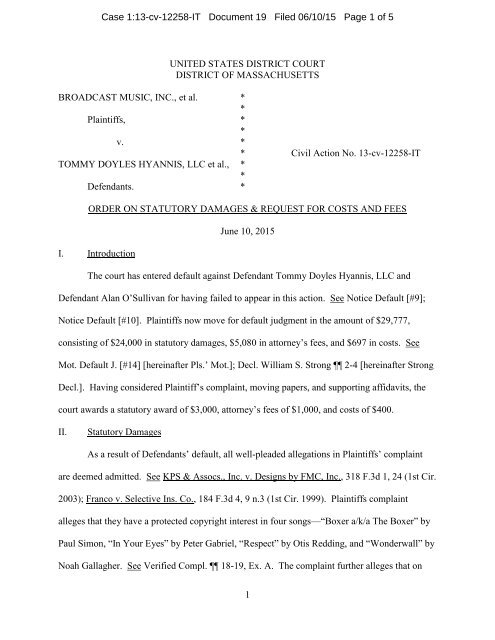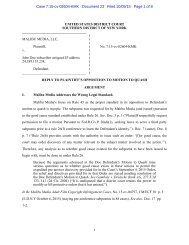BMI-v-Tommy-Doyles-Hyannis
BMI-v-Tommy-Doyles-Hyannis
BMI-v-Tommy-Doyles-Hyannis
Create successful ePaper yourself
Turn your PDF publications into a flip-book with our unique Google optimized e-Paper software.
Case 1:13-cv-12258-IT Document 19 Filed 06/10/15 Page 1 of 5<br />
UNITED STATES DISTRICT COURT<br />
DISTRICT OF MASSACHUSETTS<br />
BROADCAST MUSIC, INC., et al. *<br />
*<br />
Plaintiffs, *<br />
*<br />
v. *<br />
* Civil Action No. 13-cv-12258-IT<br />
TOMMY DOYLES HYANNIS, LLC et al., *<br />
*<br />
Defendants. *<br />
ORDER ON STATUTORY DAMAGES & REQUEST FOR COSTS AND FEES<br />
I. Introduction<br />
June 10, 2015<br />
The court has entered default against Defendant <strong>Tommy</strong> <strong>Doyles</strong> <strong>Hyannis</strong>, LLC and<br />
Defendant Alan O’Sullivan for having failed to appear in this action. See Notice Default [#9];<br />
Notice Default [#10]. Plaintiffs now move for default judgment in the amount of $29,777,<br />
consisting of $24,000 in statutory damages, $5,080 in attorney’s fees, and $697 in costs. See<br />
Mot. Default J. [#14] [hereinafter Pls.’ Mot.]; Decl. William S. Strong 2-4 [hereinafter Strong<br />
Decl.]. Having considered Plaintiff’s complaint, moving papers, and supporting affidavits, the<br />
court awards a statutory award of $3,000, attorney’s fees of $1,000, and costs of $400.<br />
II.<br />
Statutory Damages<br />
As a result of Defendants’ default, all well-pleaded allegations in Plaintiffs’ complaint<br />
are deemed admitted. See KPS & Assocs., Inc. v. Designs by FMC, Inc., 318 F.3d 1, 24 (1st Cir.<br />
2003); Franco v. Selective Ins. Co., 184 F.3d 4, 9 n.3 (1st Cir. 1999). Plaintiffs complaint<br />
alleges that they have a protected copyright interest in four songs—“Boxer a/k/a The Boxer” by<br />
Paul Simon, “In Your Eyes” by Peter Gabriel, “Respect” by Otis Redding, and “Wonderwall” by<br />
Noah Gallagher. See Verified Compl. 18-19, Ex. A. The complaint further alleges that on<br />
1
Case 1:13-cv-12258-IT Document 19 Filed 06/10/15 Page 2 of 5<br />
June 8, 2013, Defendants publicly performed, or caused to be performed at an establishment they<br />
owned, the four protected musical works without license or permission. See id. 22, Ex. A.<br />
Accordingly, Plaintiffs have plausibly pleaded a claim of copyright infringement, and<br />
Defendants are deemed to have admitted their liability for that infringement. See Twentieth<br />
Century Music Corp. v. Aiken, 422 U.S. 151, 157 (1975) (stating that a copyright holder has an<br />
“exclusive right . . . to perform the copyrighted work publicly for profit” (citation and alterations<br />
omitted)).<br />
The Copyright Act provides that a copyright owner may receive either actual or statutory<br />
damages for infringement. See 17 U.S.C. § 504(a)(1)-(2). Absent a showing of willful<br />
infringement, statutory damages shall be “with respect to any one work, for which any one<br />
infringer is liable individually, or for which any two or more infringers are liable jointly and<br />
severally, . . . not less than $750 or more than $30,000 as the court considers just.” Id. §<br />
504(c)(1).<br />
Plaintiffs seek statutory damages in the amount of $6,000 per musical work, for a total of<br />
$24,000. Pls.’ Mem. Supp. Their Mot. Default J., 4 [#15] [hereinafter Pls.’ Mem.]. Plaintiffs<br />
justify this statutory award request on the ground that, if Defendants had purchased a yearly<br />
“blanket license agreement” for 2011, 2012, and 2013, they would have spent $8,811. See Decl.<br />
Renee S. Wolfe 3 [#17] [hereinafter Wolfe Decl.]; Decl. Brian Mullaney 17 [#18]<br />
[hereinafter Mullaney Decl.]. According to Plaintiffs, “[c]ourts consistently have held that a<br />
statutory damages award between two and five or six times the amount that the plaintiff would<br />
have received in licensing fees is appropriate.” Pls.’ Mem. at 5. Therefore, Plaintiffs suggest<br />
that an award of $24,000 (less than three times the total in alleged licensing fees) is “modest,<br />
just, and appropriate.” Id.<br />
2
Case 1:13-cv-12258-IT Document 19 Filed 06/10/15 Page 3 of 5<br />
As a preliminary matter, the complaint alleges that each of the four songs was infringed<br />
on June 8, 2013. See Verified Comp. at Ex. A. Accordingly, it is not apparent why licensing<br />
fees for 2011 and 2012 would be justified. Moreover, in support of their motion for default<br />
judgment, Plaintiffs explain that purchase of a “blanket license agreement” would “permit music<br />
users to perform any of . . . over 8.5 million musical compositions.” Wolfe Decl. 3. If a fee of<br />
$3,011 would have provided Defendants the rights to play 8.5 million songs for all of 2013, see<br />
Mullaney Decl. 17, it does not follow that an award of $24,000 is justified for the unlicensed<br />
performance of four songs, one time each. In light of the nature and scope of the infringement as<br />
compared against the yearly cost for a “blanket licensing agreement,” the courts finds that the<br />
statutory minimum award of $750 per song is appropriate, for a total award of $3,000. This<br />
amount will adequately serve the purposes of deterring putative infringers.<br />
III.<br />
Attorney’s Fees<br />
Under the Copyright Act, “the court may . . . award a reasonable attorney’s fee to the<br />
prevailing party.” 17 U.S.C. § 505; Spooner v. EEN, Inc., 644 F.3d 62, 69 (1st Cir. 2011). For<br />
claims under the Copyright Act, “attorney’s fees are to be awarded to prevailing parties only as a<br />
matter of the court’s discretion.” Fogerty v. Fantasy, Inc., 510 U.S. 517, 534 (1994). The party<br />
seeking an award of fees bears the burden of proving the reasonableness of its fee request<br />
through submission of appropriate evidence. See Hensley v. Eckerhart, 461 U.S. 424, 433<br />
(1983). Where the party fails to present sufficient evidence to justify its fee request, “the district<br />
court may reduce the award accordingly” or deny it entirely. Id.; see also Gay Officers Action<br />
League v. Puerto Rico, 247 F.3d 288, 297 (1st Cir. 2001) (“[P]revailing parties who intend to<br />
seek counsel fee awards ordinarily must ensure that contemporaneous time records are kept in<br />
3
Case 1:13-cv-12258-IT Document 19 Filed 06/10/15 Page 4 of 5<br />
reasonable detail. . . . [F]ailure to do so may have deleterious consequences (such as the slashing<br />
or disallowance of an award).” (internal citations omitted)).<br />
Plaintiffs filed a declaration in support of their motion for default judgment that states<br />
“[t]he total amount of attorney’s fees incurred in this matter . . . is $5,080.” Strong Decl. 2.<br />
However, Plaintiffs failed to provide hourly time records, indicate the hourly rate charged to<br />
reach this total, or otherwise provide information to the court justifying their requested award of<br />
fees. Moreover, the court entered default against Defendants for failure to answer. See Entry<br />
Default [#9]; Entry Default [#10]. Accordingly, litigation in this case consisted only of filing<br />
and serving the complaint and moving for default. The complaint is a form complaint. 1 It is not<br />
apparent that $5,080 in fees is reasonable for those actions. Based on Plaintiffs’ failure to<br />
provide sufficient information to justify their requested fees, the court could disallow attorney’s<br />
fees entirely. However, in its discretion, the court will instead award attorney’s fees of $1,000.<br />
This amount reasonably compensates Plaintiffs for the work done on this case without turning<br />
the discretionary award of fees into a windfall.<br />
IV.<br />
Costs<br />
The Copyright Act allows a court, in its discretion, to grant an award of full costs to a<br />
prevailing party. 17 U.S.C. § 505. Plaintiffs request $697 in costs, which they state is “primarily<br />
for filing fees and process-server fees.” Strong Decl. 3. The filing fee paid was $400. The<br />
court is unable to ascertain what portion of the remaining $297 is process server fees, and<br />
Plaintiffs provide no information regarding what other costs are claimed. Accordingly, the court<br />
1<br />
For comparison, this complaint is substantially identical in form and substance to at least three<br />
other complaints filed in this session. See, e.g., Broadcast Music, Inc. v. Michael J. Quinn, No.<br />
14-cv-10700-IT; Broadcast Music, Inc. v. King Cormac, Inc., No. 14-cv-11939-IT; Broadcast<br />
Music, Inc. v. PJML, Inc., No. 13-cv-12212-IT.<br />
4
Case 1:13-cv-12258-IT Document 19 Filed 06/10/15 Page 5 of 5<br />
cannot determine if the sought-after costs are properly recoverable. Therefore, the court in its<br />
discretion awards only the $400 in costs from the filing fee in this case.<br />
V. Permanent Injunction<br />
Injunctive relief may be appropriate “where (1) the plaintiff has prevailed on the merits,<br />
(2) the plaintiff would suffer irreparable injury in the absence of injunctive relief, (3) the harm to<br />
the plaintiff would outweigh the harm to the defendants from an injunction, and (4) the<br />
injunction would not adversely affect the public interest.” Joyce v. Town of Dennis, 720 F.3d<br />
12, 25 (1st Cir. 2013). “To be entitled to a forward-looking remedy, a plaintiff must satisfy the<br />
basic requisites of equitable relief—‘the likelihood of substantial and immediate irreparable<br />
injury, and the inadequacy of remedies at law.’” Steir v. Girl Scouts of the USA, 383 F.3d 7, 16<br />
(1st Cir. 2004) (quoting O’Shea v. Littleton, 414 U.S. 488, 502 (1974)). This requires a showing<br />
“either that some past unlawful conduct has continuing impact . . . , or else . . . a likelihood of<br />
future unlawful conduct on the defendant’s part.” Lopez v. Garriga, 917 F.2d 63, 67 (1st Cir.<br />
1990) (internal citations omitted).<br />
Plaintiffs have failed to make a showing that they are entitled to a permanent injunction.<br />
Plaintiffs’ complaint does not plead that Defendants continue to infringe the musical works at<br />
issue or that they are likely to infringe those works again in the future. According to Plaintiffs,<br />
Defendant <strong>Tommy</strong> <strong>Doyles</strong> <strong>Hyannis</strong> is no longer in business. Pls.’ Mem. at 6. Accordingly, the<br />
court denies the request for a permanent injunction.<br />
IT IS SO ORDERED.<br />
June 10, 2015<br />
/s/ Indira Talwani<br />
United States District Judge<br />
5



